Share This
Videos & Podcasts
Here are a few recordings of invited lectures, public talks, panel contributions and broadcasts that I’ve given over the past few years. You can also view some of these videos on my YouTube Channel.
This is a recording of my interview with Margaret Atwood on the Main Stage of New Scientist Live 2017. The event, titled “Science, fiction and the future”, took place at the ExCeL Centre in London on Sunday 1st October 2017. We discussed Atwood’s prodigious writing career, focussing in particular on the importance of science and futurity in novels such as The Handmaid’s Tale (1985), Oryx and Crake (2003), The Year of the Flood (2009), MaddAddam (2013) andThe Heart Goes Last (2015).
Here’s a short video I made with Rebecca Machin about the “Imagined Futures” display I curated for the Museum of London, which was installed at the Rotunda Terrace from 21 October 2017 to 22 April 2018 and featured as part of the Museum’s year-long “City Now: City Future” programme of events.
I was invited to participate in a panel discussion as part of the LSE Literary Festival 2015, titled “Visions of Future Humans: Science Fiction and Human Enhancement.” The panel consisted of Professor Adam Roberts (Royal Holloway), Dr Andres Sandberg (Future of Humanity Institute, Oxford) and Imre Bard who chaired the session. My short talk considered the human-robot boundary, outlining the early 20th century historical context for influential science fictions such as H. G. Wells’ The War of the Worlds (1898), Karel Čapek’s play Rossum’s Universal Robots (1921) and Fritz Lang’s Expressionist film Metropolis (1927). It then considers more contemporary cyborgs including recent films and TV shows such as Limitless, Her, Lucy, Fringe, and Continuum.
In 2016 I was interviewed for a BBC One documentary about the life of H. G. Wells, titled ‘Future Tense: The Story of H. G. Wells.’ Broadcast on television on 16 September 2016, the documentary was part of a range of events celebrating the 150th anniversary of Wells’ birth, including talks, an academic conference, guided walks through Woking and art projects themed around Wells’ novels.
My involvement in the documentary came out of discussions with the producers about Wells’ lasting influence in science fiction. My interview focussed specifically on two of his early scientific romances – The Time Machine (1895) and The War of the Worlds (1898) – two texts that I have been teaching at Birkbeck and thinking about over the past couple of years as I extend my research into science fiction. Other interviewees in the documentary include the film critic and broadcaster Kim Newman, British SF novelist Stephen Baxter, Professor Simon John James (author of Maps of Utopia: H. G. Wells, Modernity and the End of Culture [OUP, 2012]), the novelist Louisa Treger, Michael Sherborne (Wells’ biographer), and the historian Dr Emelyne Godfrey.
CLICK HERE TO LISTEN TO THE BBC RADIO 4 DOCUMENTARY.
I was delighted to be involved in the making of a documentary for BBC Radio 4 on the subject of Martian utopias. Broadcast in March 2017 as part of Radio 4’s Mars Season, the documentary — titled “A New Red World” — featured several clips in which I discussed how the red planet has been depicted in utopian literature from the 1890s to the present day. Produced by Mark Burman and presented by Ken Hollings (with whom I spoke on a panel as part of the fig-2 exhibition at the ICA in June 2015), the documentary considered a range of Martian utopias, from early Bolshevik visions of inter-planetary revolution to feminist Martian societies, peace loving druids, vegetarian fruitarian dwarves and big science terra-forming.
This video is of a 20-minute talk I gave at the Hillingdon Literary Festival in November 2016. In this talk, I consider the emergence of utopia with Thomas More’s coinage of Utopia in his 1516 text and its development in a number of significant and slippery Renaissance texts, such as Tommaso Campanella’s The City of the Sun (1602), Francis Bacon’s New Atlantis (1627), and Margaret Cavendish’s The Blazing World (1666). I then consider the move from eutopia (no place) to euchronia (no time) in the futuristic visions of the late 19th-century utopians, such as William Morris, Edward Bellamy, Samuel Butler and, a little later on, Charlotte Perkins Gilman in her remarkable self-published narrative Herland (1915). I briefly consider the anti-utopian backlash and the rise of the dystopian imaginary in the 1930s-50s before returning to the 1960s social movements of feminism, the environmental movement and the New Left; all of which informed what Tom Moylan calls the “critical utopias” by writers like Marge Piercy, Joanna Russ and Ursula K. Le Guin. The talk closes with a consideration of what the utopian imaginary looks like in contemporary 21st-century novels, particularly with respect to utopia’s entanglement with apocalypticism – briefly discussing writers such as Joanna Kavenna, David Mitchell, Emily St. John Mandel, Jim Crace and Maggie Gee.
This was an invited talk I gave at Senate House, University of London in July 2016 titled “Transforming Scholarship in the Digital Environment” – as part of the Social Scholar series.
CLICK HERE TO LISTEN TO THIS BBC RADIO 3 PROGRAMME.
This discussion of the literary Weird was broadcast on BBC Radio 3’s late-night programme “Free Thinking”. Since co-editing an essay collection on China Miéville, China Miéville: Critical Essays (Gylphi, 2015), I’ve been thinking a bit more about the New Weird movement in the early 2000s and its relationship to the Golden Age of literary weird (which S. T. Joshi defines as c.1880-1940) as well as whatever we are calling 21st-century Weird fiction in the 2010s (Miéville himself has recently been using the term “post-Weird”). Click on the image above to listen to the programme.
CLICK HERE TO LISTEN TO THIS PROGRAMME ON BBC IPLAYER.
The BBC World Service invited me to be interviewed for a programme titled “Crunch Lit,” which explored the rise in recent novels and plays dealing with the 2008 financial crash and post-2008 economic conditions. Journalist Audrey Tinline was interested in examining the way in which literary texts can negotiate complex financial abstractions and their effects on individuals and cultural imaginaries in a way that non-fictional and economics journalism might not be able to do.
I was interviewed alongside Cristina Alger author of The Darlings (2012), which draws on her experience as a former Goldman Sachs analyst to narrate the downfall of a hedge fund and its effects on a wealthy family during the 2009 financial crisis; Adam Haslett, whose 2010 novel Union Atlantic features a senior bank manager struggling to keep his company afloat (a novel which was completed the week that Lehman Brothers collapsed in 2008); Colin C. Murphy, writer of the 2013 play Guaranteed which examines the Irish Bank Guarantee and was adapted into the 2014, The Guarantee; and Donal Ryan, author of The Spinning Heart (2013) which was shortlisted for the Booker Prize and details the devastating effects of the economic downturn on a rural Irish community.
This podcast was made at a panel discussion held at the Birkbeck Cinema in February 2017, which was followed by a screening of Richard Linklater’s 2006 film adaptation of Philip K. Dick’s classic novel, A Scanner Darkly (1977). The event was organised by the Vasari Research Centre for Art & Technology as part of their Digital Animation Series running in 2016-17. The film screening was introduced with a 45 minute panel discussion chaired by Dr Joel McKim (Lecturer in Media & Cultural Studies, Birkbeck) and I was joined by Dr James Burton (Lecturer in Cultural Studies & Cultural History, Goldsmiths). Click on the image above to listen to the programme.
As part of Birkbeck’s Arts Week in May 2015, I organised a panel on “Environmental Futures: Oil, Ecology, Petrocultures” in May 2015. The panel consisted of myself, Dr Graeme MacDonald, Associate Professor of English & Comparative Literary Studies at the University of Warwick, Dr Jennifer Gabrys, Reader in Sociology at Goldsmiths and Principal Investigator on a European Research Council funded project “Citizen Sensing and Environmental Practice: Assessing Participatory Engagements with Environments through Sensor Technologies,” which investigates citizen participation in monitoring air pollution at fracking sites. The panel discussion was followed by a poetry reading by Michael McKimm from his recent collection, Fossil Sunshine (Worple Press, 2013). Michael’s research in writing this collection was funded by Arts Council England, which allowed him to work with geologists and earth scientists investigating climate change and the oil industry.
Click below to listen to my panel introduction and paper.
Caroline Edwards introducing the panel.
Caroline Edwards, “Peak Oil in the Popular Imagination.”
As part of the Birkbeck Arts Week 2017 programme, I was invited to join my Birkbeck Colleague Dr Ben Worthy and Professor Jean Seaton for a panel discussion about the relevance of Orwell’s landmark dystopian novel Nineteen Eighty-Four (1949) to our own moment of political dystopia in 2017. Ben, a Lecturer in Birkbeck’s Department of Politics, is author of The Politics of Freedom of Information: How and Why Governments Pass Laws That Threaten Their Power (Manchester UP, 2017) and researches government transparency and issues of digital democracy, and Jean is Professor of Media History at the University of Westminster and the official historian of the BBC, as well as the Director of the Orwell Prize.
Click below to listen to the podcast of the panel discussion.
For an additional recording of the audience Q&A discussion, please visit Backdoor Broadcasting.






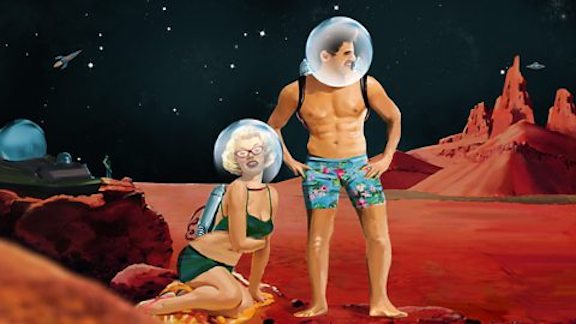
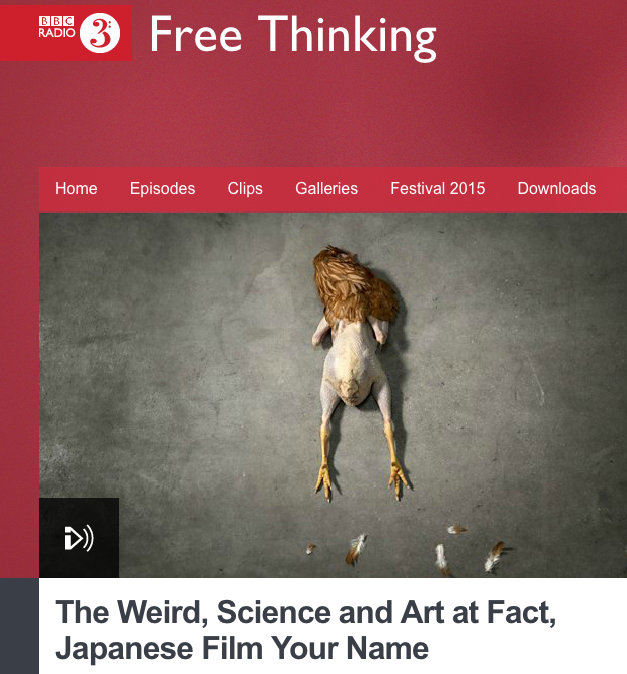
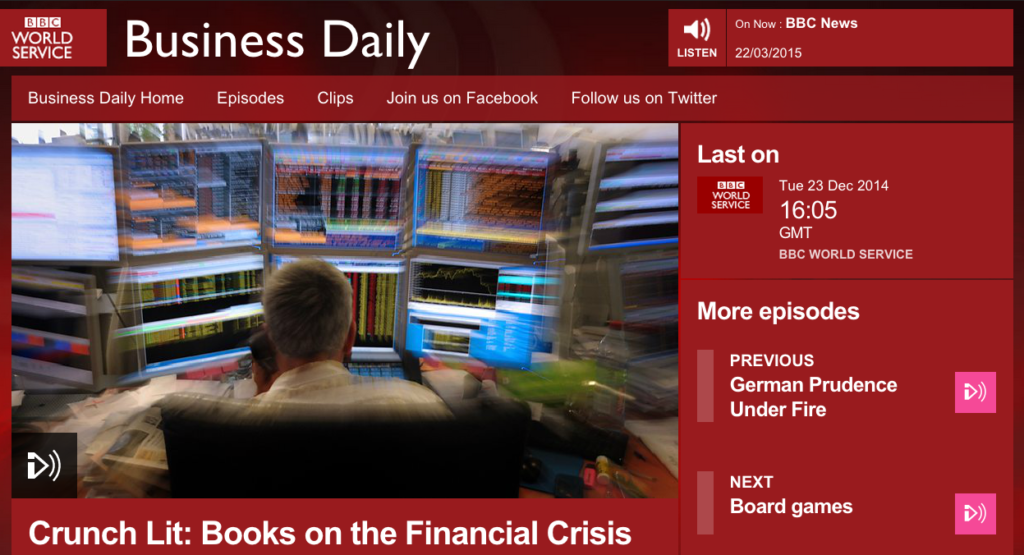
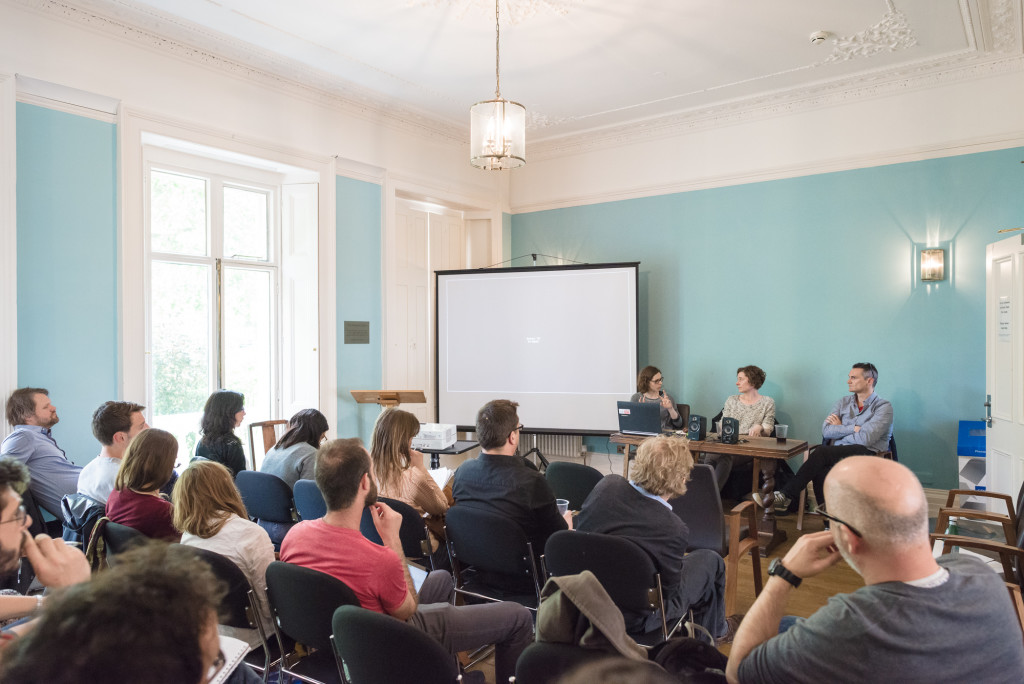
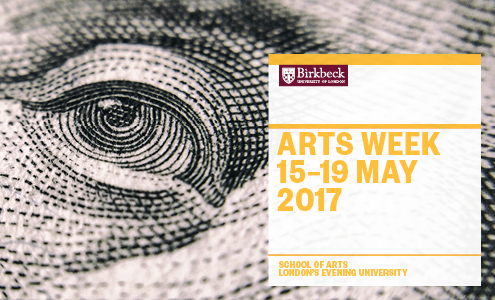
 Dr Caroline Edwards is Senior Lecturer in Modern & Contemporary Literature at Birkbeck, University of London. Her research and teaching specialisms are in 21st century literature and critical theory, science fiction and post-apocalyptic narratives, Marxist aesthetics, and utopianism.
Dr Caroline Edwards is Senior Lecturer in Modern & Contemporary Literature at Birkbeck, University of London. Her research and teaching specialisms are in 21st century literature and critical theory, science fiction and post-apocalyptic narratives, Marxist aesthetics, and utopianism.
Follow / Contact